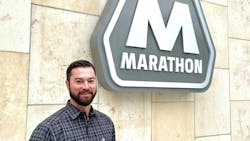Fleet Maintenance selected an Overachiever for six different categories based on reader nominations. This is the winner of the Support category. You can view the Technician category, the Trainer category, and the Supervisor category, and the Mobile Technician category here.
Marathon Petroleum Co.’s maintenance coordinator Justin Perry was close to winning this award last year, earning an honorable mention in our first Overachiever Awards program. This year he was the clear winner for his continuous support of the oil and gas company’s fleet.
Sam McCullough, asset reliability manager for Marathon, provided an exhaustive list of Perry’s responsibilities to ensure maximum uptime for the assets that haul crude oil, fuel, and other materials across the country. From spec’ing to trading out and everything in between, Perry influences virtually all maintenance and equipment operations.
For instance, he provides daily reports on out-of-service assets and sees that they get repaired on time, staying on top of dealers and manufacturers to prioritize and expedite those repairs, McCullough noted in his nomination of Perry.
He also lauded Perry for his ability to negotiate better labor and material rates with major vendors, as well as his acumen in finding the best differentials and transmissions per the trucks’ and tankers’ specific duty cycles, and coming up with mitigation plans when any issues arise.
“One of my main focuses is making sure that we capture as much warranty as possible, since we have a pretty good life cycle replacement strategy,” Perry explained. The fleet aims to change out at under 500,000 miles, or around five years.
Read more: The 500,000 mile question: Should you trade in or keep your trucks?
Perry will routinely review repair orders in case a warranty opportunity was missed, and then submit policy requests to the dealers. Overall, he ratably claims $1 million in warranty, policy, and reimbursement year over year, McCullough noted.
And by diving into the Trimble TMT fleet management platform, Perry can help identify failure trends and alert the disparate shops to stay ahead of potential issues.
“Each one of our service centers is not really that big, two to four bays, so we don’t have a whole lot of techs at each shop,” the 43-year-old explained. “They have to obviously know those VMRS codes. If they don’t input those correctly, then that makes it difficult on our end to figure out what’s going on.”
He also fosters more awareness between shops with service bulletins that include technician tips and recall and repair news from the manufacturers.
“If a fleet is seeing a recurring issue, we want to make sure we get that out across to everybody, because the guys in Ohio do not talk to the guys in California,” Perry emphasized, adding that sometimes this intel sharing has allowed the fleet to catch failures before they happen.
He said having a good relationship with the dealers, including Kenworth, Peterbilt, and Mack, is vital.
Justin Perry with his wife Kelly and daughters Amberlynn (right) and Hailey (center).
And those relationships will become even more important as the industry rushes to prebuy trucks before the more costly low-NOx compliant MY 2027 heavy-duty trucks roll out.
“There’s only a certain amount of trucks and engines that they’re going to be able to sell, and we got to make sure to get in there quickly and get our allotment so that we can meet the life cycle replacement needs,” explained Perry, who advises upper management on what to spec.
Getting trucks with legacy engines is “tricky” because “the huge monster fleets are gobbling those up first.”
His constant communication with around 30 OEMs and vendors—he talks to up to 10 a day—has given him an edge.
“Dealing with the manufacturers directly has been super helpful,” Perry explained. “I would say a lot of this job is just making connections, and then getting everybody together and working through the issues collectively.”
At the same time, Perry attends various emissions webinars and conferences to keep up on California Air Resources Board (CARB) regulations. This is especially critical for drayage operations at the ports, as CARB is pushing for zero-emission vehicle mandates, a complicated subject for Marathon and other oil companies.
“Having electric vehicles hauling petroleum products—it’s kind of a conundrum,” Perry noted.
About the Author

John Hitch
Editor-in-chief, Fleet Maintenance
John Hitch is the award-winning editor-in-chief of Fleet Maintenance, where his mission is to provide maintenance leaders and technicians with the the latest information on tools, strategies, and best practices to keep their fleets' commercial vehicles moving.
He is based out of Cleveland, Ohio, and has worked in the B2B journalism space for more than a decade. Hitch was previously senior editor for FleetOwner and before that was technology editor for IndustryWeek and and managing editor of New Equipment Digest.
Hitch graduated from Kent State University and was editor of the student magazine The Burr in 2009.
The former sonar technician served honorably aboard the fast-attack submarine USS Oklahoma City (SSN-723), where he participated in counter-drug ops, an under-ice expedition, and other missions he's not allowed to talk about for several more decades.

